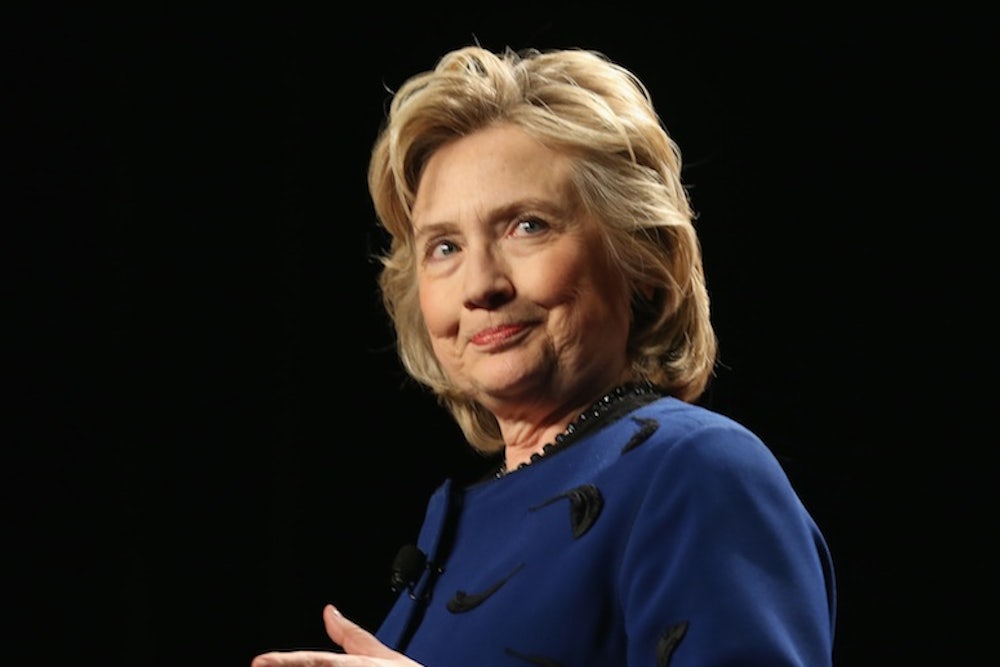Speaking at a charity fundraiser Tuesday in California, former Secretary of State and putative future presidential candidate Hillary Clinton compared Russian President Vladimir Putin to Adolph Hitler, reported BuzzFeed’s Ruby Cramer, citing two attendees, one of whom spoke on the record.
Specifically, Clinton reportedly homed in on the fact that two weeks ago—before the present crisis reached full boil—the Russian consulate in Crimea’s capital was handing out passports to Russians living in the peninsula. It’s not clear from Cramer’s article to what exactly Clinton was comparing this. Putin’s actions regarding Crimea have been compared to the Anschluss, in which Hitler annexed largely German Austria in 1938, and to the annexation of the Sudetenland, a predominantly German part of Czechoslovakia, also in 1938. Alternatively, Hitler resettled hundreds of thousands of ethnic Germans in newly conquered territories to the east as part of his broader project of uniting the German people under a common regime and also providing them with the Lebensraum, or “living room,” they deserved (something he was able to do thanks to the non-aggression pact he signed with Joseph Stalin).
“[Clinton] said, however, that while that makes people nervous, there is no indication that Putin is as irrational as the instigator of World War Two,” attendee Harry Saltzgaver told Cramer. A Clinton spokesperson has not responded to Cramer’s request for comment.
(Side-note: On the same day BuzzFeed published this terrific scoop, it published a completely insipid “‘The Hills’ Explains Vladimir Putin Invading Ukraine.” Plus the cat pictures. BuzzFeed is increasingly like the Internet’s manifestation of the Internet, something Borges would have thought up if he were still around.)
No matter which Hitler moment Clinton was referring to, she can’t have been making a particularly apt analogy. It makes her seem like an Internet commenter. And even if it were a good analogy, it is not one a prominent American statesperson—even one currently in the private sector—should make. It risks inflaming the testy U.S.-Russia détente, or perhaps complicating the present inflammation. (Russia isn’t a huge fan of Hitler’s either, what with the over 25 million Soviet deaths in World War Two.)
Plus, Clinton should speak carefully, being in a uniquely delicate situation: a former top diplomat, a potential future commander-in-chief, a current private citizen. The administration can’t really disown her remarks—it doesn’t own them in the first place—yet it would not be insane of Putin to interpret them as reflecting high-level American thinking (and even if that would be insane, well, Putin may be insane).
If there is a silver lining, it is that there isn’t likely to be extensive political fallout for Clinton. The knock on her, after all, is that she refuses to stand up to America’s enemies, not that she too eagerly compares them to the greatest enemy of them all. Neoconservative Sen. Lindsey Graham believes, as he tweeted Tuesday, “It started with Benghazi. When you kill Americans and nobody pays a price, you invite this kind of aggression. #Ukraine.” Yet he was comparing Putin to Hitler months ago. Given that no public figure is more associated with the Benghazi debacle than Clinton, he cannot possibly square a narrative in which she is weak, a narrative in which Putin is like Hitler, and a narrative in which Clinton’s saying Putin is like Hitler makes her unfit to lead. (Tune in next week to see how he squares those narratives.)
